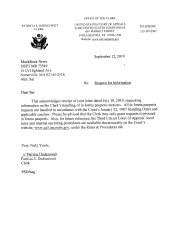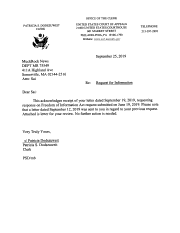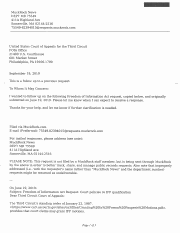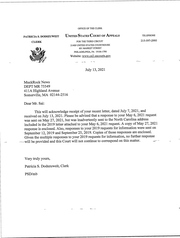Court policies re IFP qualification
| Submitted | June 19, 2019 |
| Est. Completion | None |
MuckRock users can file, duplicate, track, and share public records requests like this one. Learn more.
Communications
From: Sai
Dear Third Circuit Court of Appeals:
The Third Circuit's standing order of January 22, 1987, <https://www.ca3.uscourts.gov/sites/ca3/files/Granting%20In%20Forma%20Pauperis%20Motions.pdf>, provides that court clerks may grant IFP motions.
Since clerks have no Article III authority, and it would be improper for them to be vested to exercise discretion, the court must have a policy or other statement of the standards by which a person qualifies for IFP status.
I hereby request all documents setting forth the circumstances under which a clerk of the Third Circuit is to grant an IFP motion, or to forward it to a judge, pursuant to the Jan. 22, 1987 standing order.
I recognize that the judiciary is not covered by the Freedom of Information Act.
This request is made pursuant to the Rules Enabling Act and Judicial Improvements and Access to Justice Act, 28 U.S. Code §§ 332(d)(1), 2071(b), 2071(d), and 2077(a) (requiring publication of all "rules" and "operating procedures"); and the Judiciary's internal policies which provide for access to records in a way similar to the Freedom of Information Act.
I am partially blind. I request that you make all responses by email, and provide records in their original, native electronic format if you have an electronic copy, and by a PDF scan if you only have the records in paper format.
This request is made on behalf of both myself, Sai (in personal capacity) and Fiat Fiendum, Inc. (in official capacity). Fiat Fiendum is a 501(c)(3) nonprofit organization whose purposes include promotion of transparency in laws and research on topics related to the judiciary.
Please note that “Sai” is my full legal name. I am agender.
For any documents too large to send by email, there is an upload link below. There is also a physical address below. Please do not physically mail any responses without my explicit request; instead, send everything by email or by upload to the link below.
Sincerely,
Sai
President, Fiat Fiendum, Inc.
From: Muckrock Staff
To Whom It May Concern:
I wanted to follow up on the following Freedom of Information Act request, copied below, and originally submitted on June 19, 2019. Please let me know when I can expect to receive a response.
Thanks for your help, and let me know if further clarification is needed.
From: Muckrock Staff
To Whom It May Concern:
I wanted to follow up on the following Freedom of Information Act request, copied below, and originally submitted on June 19, 2019. Please let me know when I can expect to receive a response.
Thanks for your help, and let me know if further clarification is needed.
From: United States Court of Appeals for the Third Circuit
An acknowledgement letter, stating the request is being processed.
From: Muckrock Staff
To Whom It May Concern:
I wanted to follow up on the following Freedom of Information Act request, copied below, and originally submitted on June 19, 2019. Please let me know when I can expect to receive a response.
Thanks for your help, and let me know if further clarification is needed.
From: United States Court of Appeals for the Third Circuit
A fix is required to perfect the request.
From:
Hell,
We received TPRA request for "currently valid policies/procedures relating to public housing and Section 8 housing assistance eligibility. Can you please provide proof of Tennessee citizenship?
Thank you,
[cid:image001.png@01D0D910.E195F630]Will Choppin, General Counsel
Metropolitan Development and Housing Agency
701 South Sixth Street, Nashville, Tennessee 37206
Office: (615) 252-6710 | Fax: (615) 687-4376
The information contained in this electronic message and any attachments are intended for the exclusive use of the designated recipient(s). It may contain confidential or proprietary information and may be subject to the attorney-client privilege or other confidentiality protections. If you are not the intended recipient, or the person responsible for delivering the e-mail to the intended recipient, be advised you have received this message in error and that any use, dissemination, forwarding, printing, or copying is strictly prohibited.
-

image001
From: Sai
Dear Third Circuit and Nashville Metropolitan Development and Housing Agency:
I have no idea why the Nashville MDHA responded to this request. It was not made pursuant to the TPRA, and has nothing to do with Nashville.
It is directed at the U.S. Court of Appeals for the Third Circuit, not Nashville.
As for the legal basis, as the request says:
"This request is made pursuant to the Rules Enabling Act and Judicial Improvements and Access to Justice Act, 28 U.S. Code §§ 332(d)(1), 2071(b), 2071(d), and 2077(a) (requiring publication of all "rules" and "operating procedures"); and the Judiciary's internal policies which provide for access to records in a way similar to the Freedom of Information Act."
Sincerely,
Sai
From: Sai
Dear Clerk of the Third Circuit Court of Appeals:
Thank you for your letter.
1. I am well aware that the Court must obey case law, that the Jan. 22, 1987 Standing Order applies to IFP requests, and that the Clerk may grant (but not deny) IFP requests. That was stated in my request.
The Court's published local rules and internal operating procedures do not contain the information I requested.
Again, I request the Court's rules, operating procedures, or other internal policies that relate to the Jan. 22, 1987 Standing Order, e.g. any statement of the specific criteria, thresholds, or other rules under which the Clerk is to grant IFP requests. The Clerk has no lawful discretion to merely make such determinations at whim, so there must be such a policy, yet it has not been published.
I also request all notice & comment records related to the IFP Standing Order.
This information is required to be published by law. See 28 U.S. Code §§ 332(d)(1), 2071(b), 2071(d), and 2077(a).
2. I stated that I am partially blind and otherwise disabled, and requested that you respond by *electronic*, § 508 accessible form, by email. You ignored my request, and responded by paper, stating no justification at all. This is both rude and illegal.
Please respond in 508 accessible format by email in the future. Full access to the courts is a fundamental right for all, and responding to me by paper impairs my right of access.
3. I hereby petition the Court to:
a) immediately publish all of its currently unpublished or unwritten rules [1] (including in particular the one described in part (1) above), and
b) promptly initiate a retroactive notice & comment process on all such rules, otherwise consistent with ordinary rulemaking procedures.
The Court's unwritten policy of when the Clerk is to grant IFP motions, and when to forward them to a judge instead, violates the Rules Enabling Act and Judicial Improvements and Access to Justice Act, which unambiguously mandate that courts’ rules, procedures, and policies must be published, and unless an emergency, promulgated subject to a prior notice and comment process. [2]
All “unwritten” or unpublished policies, procedures, or rules of this Court plainly violate the law.
See also In re Sai, No. 19-5039 (1st Cir., filed May 15, 2019) (petitioning for same)
I further move for CM/ECF access, on the basis that I meet all standards for CM/ECF usage and currently have CM/ECF accounts in D. D.C., N.D. Cal., 1st Cir. D.C. Cir., & 9th Cir, which facts I hereby swear to be true pursuant to 28 U.S. Code § 1746. Please provide me with pro se access to the petition action under my next-gen CM/ECF account. My contact details for petition docketing purposes are below my signature. (Please continue to use the MuckRock contact details for response to this information request.)
I do not believe any fee payment is required or permitted. First, the petition arises from the Court's own failure to obey clear law. Second, 28 U.S.C. §§ 332, 2071, & 2077 do not allow fees. Third, this is in essence an APA petition for rulemaking, except that it is made under the judicial equivalents, i.e. the REA & JIAJA, and no fee may be charged for petitions for rulemaking, as they are a fundamental right under the Petition Clause of the First Amendment.
Respectfully submitted to the Court,
/s/ Sai
500 Westover Dr. #54514
Sanford, NC 27330
(510) 394 4724
legal@s.ai
CM/ECF account: saizai_pacer
[1] By “rule”, I include any procedure or policy, “including [] operating procedures”, that may affect the interests of litigants or the public, or the transparency of or trust in the judiciary — i.e. any that are not purely internal in nature. A policy affecting the circumstances under which an IFP motion is granted by the Clerk is a prime example of a “rule” for which publication is mandatory.
[2] 28 U.S. Code § 2071(b): “Any rule prescribed by a court ... shall be prescribed only after giving appropriate public notice and an opportunity for comment.” § 2071(d) further states that “copies of all rules prescribed by a court ... shall be ... made available to the public.”
28 U.S. Code § 2077(a): “The rules for the conduct of the business of each court of appeals, including the operating procedures of such court, shall be published.”
28 U.S. Code § 332(d)(1): “Any general order relating to practice and procedure shall be made or amended only after giving appropriate public notice and an opportunity for comment.”
From: Muckrock Staff
To Whom It May Concern:
I wanted to follow up on the following Freedom of Information Act request, copied below, and originally submitted on June 19, 2019. Please let me know when I can expect to receive a response.
Thanks for your help, and let me know if further clarification is needed.
From: Muckrock Staff
To Whom It May Concern:
I wanted to follow up on the following Freedom of Information Act request, copied below, and originally submitted on June 19, 2019. Please let me know when I can expect to receive a response.
Thanks for your help, and let me know if further clarification is needed.
From: Muckrock Staff
To Whom It May Concern:
I wanted to follow up on the following Freedom of Information Act request, copied below, and originally submitted on June 19, 2019. Please let me know when I can expect to receive a response.
Thanks for your help, and let me know if further clarification is needed.
From: Muckrock Staff
To Whom It May Concern:
I wanted to follow up on the following Freedom of Information Act request, copied below, and originally submitted on June 19, 2019. Please let me know when I can expect to receive a response.
Thanks for your help, and let me know if further clarification is needed.
From: Muckrock Staff
To Whom It May Concern:
I wanted to follow up on the following Freedom of Information Act request, copied below, and originally submitted on June 19, 2019. Please let me know when I can expect to receive a response.
Thanks for your help, and let me know if further clarification is needed.
From: United States Court of Appeals for the Third Circuit
A fix is required to perfect the request.
Files
pages



